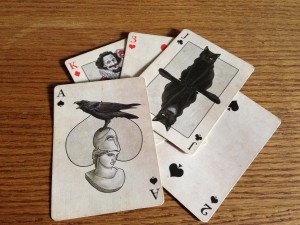I’m not a gambler. Um, well, I’m not a conventional gambler. Just being a writer is gambling. I pound out story starts that may never get endings. I submit or share drafts and hope my work will be well received. And I do freelance work to keep the lights on so I can write fiction into the night.
Writing leaves enough to chance for me, but many people love to gamble and I’m fascinated by their worship of LUCK. When I learn that a friend, client, colleague or acquaintance enjoys trips to Atlantic City and/or Vegas, buys lottery tickets on a regular basis, or participates in sports pools, I feel compelled to inquire. I want to understand what it is about courting chance that inspires them to play—and play and play.
Compulsive gambling is a big, bad deal and, like other compulsive behaviors, is self-destructive. We all know people addicted to food, or to being thin, or to work, or to working out, or to shopping, etc. It’s also obvious that, in smaller doses, there’s nothing wrong with food, staying fit, working hard, going to the gym, enjoying a bargain, etc. It’s the scale of the behavior and the overwhelming compulsion that pushes normal eating—and normal gambling—into the big/bad category.
I’m most interested in the normal end of the scale, in the person experiencing a thrill in winning five bucks in the state lottery & dreaming of the multi-million dollar win. I want to understand the thrill in playing a one-armed bandit with a bucket full of tokens on the busy floor of a casino. I don’t get it.
I spend plenty of money on entertainment—theater, music, going out dancing, visiting museums, traveling—so it’s not like I’m cheap about fun. I just don’t get the ‘game’ part. Yes, it’s true that when I buy expensive tickets to a Broadway show there is no guarantee that I’ll enjoy it. The same goes for paying the entrance fee at a Milonga (Tango dance), downloading an ebook or handing over a $20 to go one of the more expensive museums in New York or other cities.
But gambling is all about taking the chance and that is both intriguing and distressing. The monetary payoff is a potent carrot that fails to entice me the way orchestra seats at the winner of last season’s Tony award does…(I just bought tickets to see Fun Home and I hope it’s as good as the reviews.)
So, tell me what I’m missing. I take risks in my life and write about risk takers, but gamblers are still mystifying and I want to know more!






Sorry, no idea. The thing I hate most about the games I play online is the necessity of ‘random number generation’. Essentially, it’s the digital equivalent of luck. I hate it because I have never been a lucky person, at least not in the conventional sense. As a result I trust as little to luck as possible – hence no gambling.
All that said, I suspect a professional gambler is all about control too, just a different sort of control. -shrug- It’s a strange one.
Still the enchantment of LUCK, the worship of if and the pursuit of it… it’s fascinating. You may be right about the professional gambler, that he or she is out-of-control, too. Although, I doubt that goes for card counters. They are all about the math in games of chance, subverting the idea of luck by controlling (or at least tracking) the cards in a systematic manner. All games rely on some level of chance. Even Scrabble! I’m not particularly good at games. Bottom line—the pursuit of luck is an element in a character I’d like to explore!
For the average gambler a lot seems to come down to the “what if” factor. That this might be the time they get lucky. It’s a mildly titillating endless pursuit. I like the weird little things gamblers do too. When my mom plays slot machines, she finds favorite ones and has a whole system for deciding what one is lucky that certainly defies logic.
Her behavior has that gambler’s approach to life. ‘There’s a system’ ‘There’s a lucky route’ …
The power of ‘what if’ also seems essential to the gambler. ‘What if this is my lucky day?’ That means they have to show up and gamble because they could miss the wave of luck if they don’t show up. I think writers gamble too. ‘What if this is my lucky break book?’ Runs through our minds, but I don’t think the small chance of success is what drives us (there’s that storytelling gene). I’m curious about characters that live in that ‘what if’ moment’ as they pull the machine’s arm, place their chips down or watch the wheel spin toward ‘fate.’
My mother taught us how to play Black Jack (21) when we were kids in a summer house on a rainy afternoon. We played for pretzels. You could always eat your opponent’s winnings.